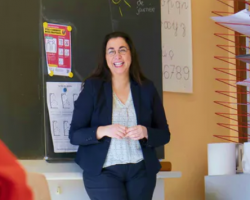Is NZ’s PM Jacinda Ardern “perhaps the most effective leader on the planet?” The Atlantic thinks so.
Another busy week … stuck in a room, in front of a screen.
I’ve had six painters wandering around the exterior of my house for the past two weeks. Lovely, polite and industrious chaps. Every day I leave the doors open and listen to their music and chit chat (remarkably free of coronavirus talk). Today, crooned by the Seekers (true!) all the talk is about Game of Thrones (serious!). Is Jon Snow heading for trouble and are the Night Walkers too violent? Verdict: possibly; and yes. Best character? Joh Snow. Unanimous.

Hang on! I can’t let that go. “Eh, what about Daenerys Mother of Dragons?” I bellow out the door.
Big laughs all round. “Yep, ya gotta watch out for ‘em little ones. Them ladies”, someone calls back. “Toughest of the lot!”
Don’t we know it. Despite the Donald’s latest coronavirus solution – inject people with light and litres of disinfectants (yes, true too!) – it’s ‘them ladies’ who clearly are nailing the best, most comprehensive and safest national COVID responses.
The Atlantic has suggested NZ’s Jacinda Ardern is perhaps “the most effective leader on the planet.” As Jacqui True points out in her Prio blog, while the pandemic “is exposing the fragility in all our systems” it is also highlighting a different, more effective form of female leadership in which New Zealand, Germany, Norway, Taiwan, and Denmark – and we would add Finland – have all demonstrated not only compassion, but their holistic “human security approach” has enabled a focus on our very human needs and fears, in addition to national considerations around the economy, politics and health services.
But of course, no sooner do we point out the different style of leadership women heads of state are successfully showcasing, than another woman wants to shout that down. In our BroadAgenda Gender News this week, Ella Whelan from Spiked is screaming sexism in ‘No, female leaders are not better at fighting COVID-19’.
 Also in Gender News, an excellent piece by Lyn Craig on the true value of women’s work – and how we must not allow this truth to remain hidden in the ‘snap forward’ post-COVID world. More too on how ‘Millions of Women Became the Most Essential Workers in America’ – a fact which has clearly escaped The Donald whose latest folly is his ‘Opening Our Country’ Council, with 220 men on board and a tiny weeny 20 women.
Also in Gender News, an excellent piece by Lyn Craig on the true value of women’s work – and how we must not allow this truth to remain hidden in the ‘snap forward’ post-COVID world. More too on how ‘Millions of Women Became the Most Essential Workers in America’ – a fact which has clearly escaped The Donald whose latest folly is his ‘Opening Our Country’ Council, with 220 men on board and a tiny weeny 20 women.
Still on COVID, over at The Australian, Caroline Overington explains how Aussie men are doing it really tough, because men “who are conditioned to work” are now board at home and “are struggling”; they are used to doing “most of the paid work … because they want to shelter and protect women and children”. She suggests “it’s probably not a bad thing for them to know what it’s like to work from home, when you’ve got small children under foot…” but overall Overington reckons men are doing it too tough. (I had to read this twice, as I wasn’t sure if she was pulling my leg. But I think she’s serious).
Twitter went in to a twit storm this week over sexist slurs – by media – about women in media, as well as the highly sexualised nature of trolling. (More from BroadAgenda on this down the track).

And some good news, while Canada has topped the world rankings for women in civil service in the Women Leaders Index, we’re pleased to see that Australia comes in second.
More good news! The University of Canberra, home to the 50/50 by 2030 Foundation and BroadAgenda, has just been ranked #20 in the world for Gender Equality Impact. We’re pretty chuffed by that!
It’s been a very busy week for us. The 50/50 Foundation hosted a virtual COVID Gender Network roundtable in which we heard what a number of women’s advocacy groups, academics and rights organisations are doing in response to the pandemic. The discussion focused specifically on tracking unpaid work and care – a critical issue that has shot to the centre of our research focus right now.
Following the roundtable I recorded an interview with one of the participants, Liz Broderick, given the UN Human Rights Council working group on discrimination against women and children has this week released a statement calling on all governments, ours included, to better protect women and girls in COVID policy responses.
 Unfailingly generous with her time, Liz discusses how a global “reimagining is required” and indeed possible. “It’s an opportunity to put care at the centre of societies, the economy, our wellbeing and then see what will shift.”
Unfailingly generous with her time, Liz discusses how a global “reimagining is required” and indeed possible. “It’s an opportunity to put care at the centre of societies, the economy, our wellbeing and then see what will shift.”
She also explains the UN’s fear that home isolation is placing 980 million women in danger, given that “for nearly 1 billion women we know that home is not a safe place.” (Listen to Liz here…)
Also in BroadAgenda this week, Amy Haddad on ’10 things you need to know about human rights and COVID-19’, which includes a very handy list of 5 actions you can take right now. Olena Hankivsky and Anuj Kapilashrami tackle the urgent need for an intersectional approach to COVID-19 policy responses.
Julie Hare gives a shout out to smart thinking by a chap from Austrade, and also the clever career management and job-sharing of the Swiss, in Swiss ambassadors show the way.
Now, my painters are about to knock off early – it’s Friday – but before they go, I’ve got an argument to win. If not Mother of Dragons, surely they must love Brienne of Tarth?
After all, she’s a man slayer, a head chopper, and nearly 7 ft tall!. 
I hope the sun is shining in your closed corner of this COIVD world.
Happy weekend!




